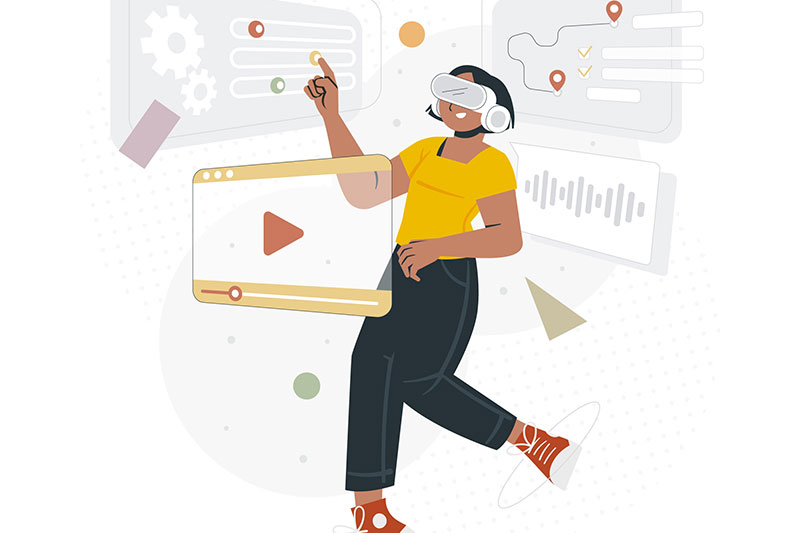Metaverse and education: what to expect in the coming years
Mark Zuckerberg popularized a word that until recently was only known among the most daring users of the technological world: metaverse.
With an air of a science fiction movie, this word may be closer to being part of our reality than we imagine, and in this post we will better understand what it means and what is the impact of the metaverse on education.

Origin of the Metaverse
If metaverse is a concept that has become popular a little while ago, largely thanks to Facebook, other terms that are part of its world, such as Augmented Reality (AR) and Virtual Reality (VR), have already been between us for a long time.
Just as it happens now with the metaverse, when people started talking about AR and VR, both technologies sounded like something not very accessible, likely to be used only by large companies.
However, over time this has changed. With technology evolving, it began to reach the general public along with its engaging proposal of an interactive digital world integrated into the real world.
This is precisely what the metaverse proposes, an augmented world with a digital overlay.
What is the Metaverse?
The Greek prefix “meta” means “beyond” – and in this case we are referring to a whole universe of possibilities beyond what modern technology is capable of. A world where physical and digital realities are combined.
It really looks like something from a movie, doesn’t it? And that’s exactly what Mark Zuckerberg said in October 2021, when he renamed Facebook to “Meta”, already preparing for a future that he believes we will be living in about ten years.
According to the CEO of the famous social network, “This may sound like science fiction –” and, indeed, the word metaverse was coined by the science fiction writer, Neal Stephenson, in1992 “– but we’re starting to see a lot of these technologies come together.”
Check out the full video:
If Zuckerberg’s prediction is confirmed, in the next decade, through virtual reality headsets, people will have access to alternative digital realities where they can learn, play and socialize.
How would the metaverse work?
In theory, logging into the metaverse would be like logging onto the Internet. Except, instead of viewing content on a screen, you’d be using a headset (and a motion tracker to pick up objects).
But nobody knows exactly how it will work, or even if it will be possible. Another question that remains is: would this technology be owned by someone? Or will each company be able to create its own metaverse?
The truth is that to create an integrated universe, no brand could own the rights to the metaverse concept.
One theory is that companies will build their platforms to be compatible and inclusive, allowing users to jump between them the same way they move from tab to tab in a browser.
However, the big players in the world of technology have already started a race to see who makes the metaverse a reality and seizes the financial potential of this market first.
In addition to Facebook, what is known so far is that in May 2021, Microsoft announced that it was working to create an “corporate metaverse”. Other companies like Snapchat, which has been combining physical and augmented reality for years, surely also have plans for a future in the metaverse.
– Tips to increase your organic traffic on Facebook
How the metaverse can be used in education
With classrooms closed during the Coronavirus pandemic, 91% of students worldwide have had their education disrupted.
This led to a real boom in online teaching, as students and teachers alike had to rush and adapt to remote learning.
Even with the initial difficulties, distance education proved to be effective and an excellent alternative to take education everywhere, ending geographic barriers.
Now, educators are asking: if the internet is beneficial for learning in its current state, what kinds of things could we do with metaverse technologies in education?
Several possibilities arise and draw a promising picture for eLearning. Below we list some:
Virtual 3D Classrooms
The experience of interaction that occurs in a physical classroom can be one of the main benefits that the metaverse brings to online education.
With this technology, it will be possible to create 3D classrooms, where students and teachers can interact virtually.
The great advantage is that students located anywhere in the world will be able to meet in the same classroom, with the advantage of doing much more than a physical room allows, since they will have all the technology at their disposal.
Extracurricular Activities
In addition to simulating the immersive experience of a classroom setting, the metaverse also allows students to participate in extracurricular activities such as sports and the arts in a virtual setting.
Much has already been said about the benefits of this technology for physical activities, which can be accompanied and guided by teachers and professionals in the area.
Students can take advantage of the use of the metaverse in education to carry out the most diverse activities, such as participating in music, reading or math clubs, the same as would happen on a physical campus.
Digital Learning
The use of videos in online courses is something quite popular, since most people’s preference for this type of media has been proven.
Now, applying the metaverse to education can make this even better, allowing students to immerse themselves in these videos and experience their content in a more real way.
Technology will also be able to create a space for carrying out practical experiments, and even face-to-face classes will be able to use this 3D virtual learning to carry out tests and activities that bring more results to teaching.
– 5 ways to sell online courses using videos
Interdisciplinary Learning
Something that is still very flawed in our face-to-face education system, the integration of disciplines can become a reality with the metaverse.
With the potential to break down barriers and promote interdisciplinary learning, teachers will have the opportunity to merge their teaching fields, blending math and science, for example, to create an engaging and holistic learning experience, while demonstrating the applications of various theories in real life.
This would certainly be a breakthrough with great benefits for students, who will be able to understand how different types of knowledge apply and work together in the world we live in.
Simulations of Real Life Situations
There is no doubt that one of the great advantages of the metaverse in education is to create a more tangible teaching, something that the student can see how it really works in the real world.
Rather than just spending hours reading about a particular subject, students will have the chance to replicate real-life situations to perform science experiments, display prototypes and much more.
In the future, we may witness 3D spaces created to aid student learning while helping teachers better explain subject content.
Practical tasks like connecting a plug, installing a drain, and even advanced medical skills like surgery can be taught using VR, consolidating learning without worrying about real-world consequences.
This is a big step towards making education more engaging and students more interested and active in their learning.
– How online teaching can support school education
Virtual Tours
A unique opportunity for those who are unable to travel, the metaverse can offer virtual tours around the world.
Imagine instead of just reading about Paris and the Louvre museum, studying art walking through its rooms in virtual environments that make this experience almost palpable, wouldn’t that be incredible?
By enabling this to happen, the metaverse helps people who otherwise would not be able to travel expand their worldview and get a better education.
Events and People
It’s not just different places that the metaverse can take you, it can also bring closer prominent people willing to teach what they know in an interactive way.
It will also be possible to participate in symposiums, conferences and lectures, taking better advantage of the richness of these experiences, even if virtually.
Accessibility and inclusion are two words that gain strength when we talk about the use of the metaverse in education.
Gamification
Finally, we can say that the metaverse in education promises to take gamification to another level.
If this is already a trend mentioned for a long time in online teaching, think about what can be done with this technology in which AR and VR predominate.
The virtual world can make school feel like a video game, with classes structured like missions and tasks like real adventures.
– How to implement gamification in eLearning
Metaverse: the next step in online education

The metaverse has many potential applications in various areas of our lives.
This technology can even be used in classrooms to raise awareness about social issues like hunger, pollution or climate change.
Students can, for example, more immersively watch a documentary about famine and poverty to gain a better emotional understanding of how this affects the people around the world.
Future of education, at Coursify.me we are already aware of this trend and we will be ready to adapt to the changes that the technological market should bring in the coming years.
Complete eLearning platform, Coursify.me is the ideal solution for anyone who wants to create, sell and promote courses on the internet.
Serving businesses and professionals in more than 60 countries, Coursify.me is a dynamic and customizable Learning Management System (LMS).
– Learning Management System: What is it?
To learn more, visit our website, take a test and dive into this world full of opportunities with us.

